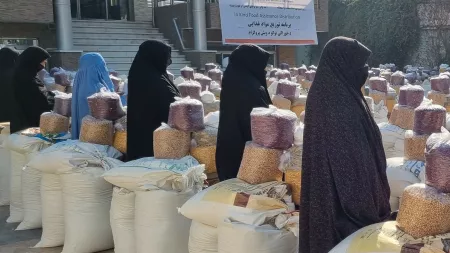The preliminary findings of a new CARE report confirm the harsh toll the food and economic crisis in Afghanistan is having on women and girls.
“Our research confirms some very concerning ways women are being impacted by the food and economic crisis in Afghanistan. Of the women surveyed, a staggering 87% report a considerable decrease in their household income since August 2021. These reduced incomes impact every facet of a family’s life, including the ability to buy enough food, to buy nutritious food, to seek urgent medical attention, to have adequate shelter - the list goes on,” said Mélissa Cornet, CARE Afghanistan’s Humanitarian Advocacy Advisor.
For the research, CARE surveyed 345 women in urban and rural communities in nine provinces in Afghanistan, conducted in-depth interviews with 18 women, carried out nine focus group discussions with men, interviews with food security specialists and humanitarian actors and a comprehensive desk review of existing data since August 2021.
The preliminary findings also confirm the devastating impact the crisis is having on girls.
“Afghanistan has seen a high spike in the practice of early and forced child marriages, where cash-strapped families unable to feed all their children resort to selling children - and those children are usually girls. Of those we surveyed, 12% of households indicated having to marry one of their daughters aged under 18 due to the food crisis. Imagine being so desperate for food that you marry off your young daughter, just so that she and the rest of the family can eat. Devastating and heartbreaking for families and shattering for little girls whose lives will be forever changed,” said Ms Cornet.
Women reported eating less food than other household members. Some 80% of women surveyed said they had to skip at least one meal in the two weeks before the research. A common trend is that there was insufficient food in the household to accommodate the needs of everyone and, as a result, women preferred feeding their children over themselves. The findings also show that men are adjusting their intake as well, to ensure their wives can eat.
One of the women surveyed in Parwan province shared, “Before August 2021, we would cook three or four food items per meal (rice, chicken, meat etc). Now we only cook one item. The food is just too expensive now. Some nights we would eat nothing and go to sleep hungry.”
Another finding shows that women’s needs are not being taken into account adequately when it comes to humanitarian assistance. Less than 15% of women surveyed had been consulted by humanitarian actors on the type of assistance they needed before receiving it, and only 19% said that the assistance had been adapted to their specific needs. Ms Cornet said, “Some aid is delivered in mosques, which are often not accessible to women and some distribution points are too far away. Distance causes issues with transportation costs and requires women to travel outside of their community, possibly needing to be accompanied by a mahram (a male relative).”
“Humanitarian agencies must ensure that all assistance takes gender equality into account, that women and girls are consulted, and that gender equality and the empowerment of women and girls is central to the response. But the provision of humanitarian aid is not sufficient unless paired with urgent action to address the economic drivers of the crisis. The international community must act immediately to prevent a deterioration of the already dire humanitarian and food security situation.”
Read the full preliminary findings of the study here.
CARE began working in Afghanistan in 1961 and has had continuous operations in the country since 1989. CARE’s programs in Afghanistan focus on women’s social and economic empowerment, education, rural development and emergency response.
Notes to the editor:
18.9 million people in Afghanistan – nearly half the population - are facing acute food insecurity.
For media enquiries, contact Suzy Sainovski, Senior Humanitarian Communications Coordinator – CARE International, [email protected].
